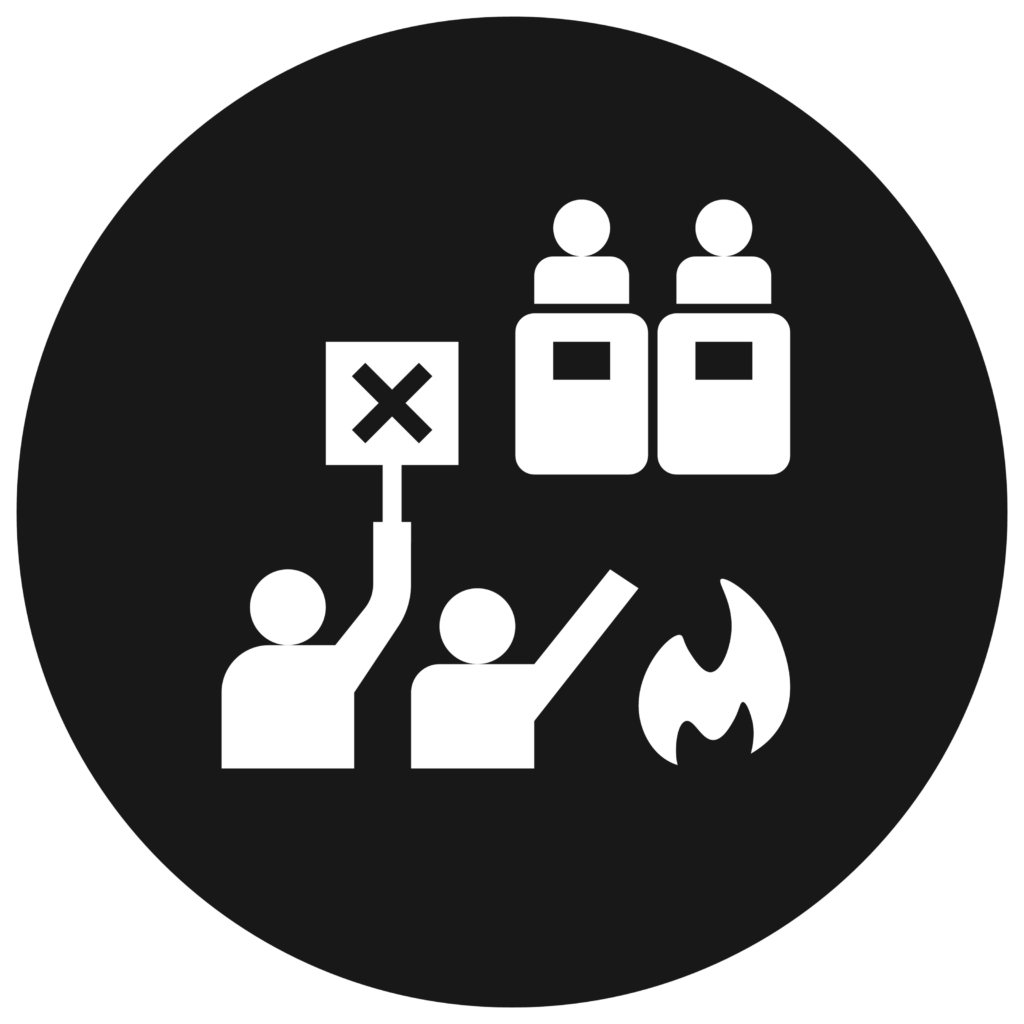Projects
Listed below are brief descriptions of the lab’s Fall 2024 projects. Please note that these projects are subject to frequent changes or removal depending on each faculty’s circumstances/needs, even after the applications are due.
China-U.S.-Taiwan Relations
 China and Taiwan have a long-standing dispute about Taiwan’s sovereignty. As China has become militarily stronger over the past few decades the dispute over Taiwan has heated up, and there is uncertainty about what role the US might play in the dispute going forward. Today, policies that sustained a fragile security balance in the past have been changed or are being challenged. This project analyzes this security problem for the purpose of adding to our understanding of international relations in general and to understand what policies might decrease tensions and contribute to a resolution of the dispute. (Led by: Professor Benson)
China and Taiwan have a long-standing dispute about Taiwan’s sovereignty. As China has become militarily stronger over the past few decades the dispute over Taiwan has heated up, and there is uncertainty about what role the US might play in the dispute going forward. Today, policies that sustained a fragile security balance in the past have been changed or are being challenged. This project analyzes this security problem for the purpose of adding to our understanding of international relations in general and to understand what policies might decrease tensions and contribute to a resolution of the dispute. (Led by: Professor Benson)
Social Media and Politics
This project examines the intersection between mis/disinformation on social media and its role in fomenting unrest in the United States. Specifically, teams will focus on scraping raw data from Telegram to understand how white supremacists coordinate protests and violence as well as using YouTube data to see how general mis/disinformation is spread and exacerbated or suppressed by the algorithm. (Led by: Professor Bisbee)
Bureaucratic Repression

This project explores the processes by which bureaucrats in all types of states use repression on behalf of national governments, and how that contrasts with the use of violence by government agents. (Led by: Professor Ritter)
Race Riots
 This project investigates the origins of all major race riots in the last 200 years of US history, to identify why police sometimes intervened to stop them but other times aided and abetted the violence. The team will work with collected data to understand patterns, do archival research to read source information about riots, and read scholarship on why race riots begin. (Led by: Professor Ritter)
This project investigates the origins of all major race riots in the last 200 years of US history, to identify why police sometimes intervened to stop them but other times aided and abetted the violence. The team will work with collected data to understand patterns, do archival research to read source information about riots, and read scholarship on why race riots begin. (Led by: Professor Ritter)
Alliances

This project studies the content of military alliances, the optimal design of alliance treaties, and implications for armed conflict. This is for a book project on how alliances might create entangling costs and why those entanglements are, under some circumstances, worth it and, at other times, risky but impossible to avoid. The project studies examples like NATO in addition to examining quantitative data on military alliances throughout history. (Led by: Professor Benson)
Small Arms Trade Networks and Political Violence

This project aims to characterize the political economy of global trade in small arms and light weapons, to show how trade networks are structured and evolve, and to explain how political violence is spread and conserved through these networks. (Led by: Professor Benson)
The Significance of Deaths in Bolivian Political Conflict

What meaning do the deaths suffered in political conflict have for social movements and political change? This project will focus specifically on Bolivia’s political conflict from 1982 to the present. It will use historical research and interviews to build a database of narratives of all the individuals who died in this conflict. Qualitative and quantitative analyses of the database will contribute to our understanding of the political impact of social movements, political and cultural constraints on violence, and the importance of violence and suffering, life and death in the process of social change. (Led by: Professor Bjork-James)
Military Capabilities

This project will identify the military capabilities owned by states around the world in the 20th and 21st century. Building on the Distribution of Military Capabilities (rDMC) Dataset, it will extend the dataset past 2014 and also categorize the military units in a more consistent manner. (Led by: Andres Gannon)
Military Interventions

This project will use wikipedia to identify the military interventions undertaken by non-US states since 1991. Building on the Distribution of Military Capabilities (rDMC) Dataset, it will produce a list of Wikipedia pages to be scraped using automated text analysis methods and then structured into a useable database. (Led by: Andres Gannon)
Cyber Power

Existing measures of national cyber power are opaque and inconsistent in what they consider relevant for a country’s cyber capacity. This project aims to identify the factors that explain why some countries are better or worse at cyber conflict, both offensively and defensively. (Led by: Andres Gannon)
National Security Strategies

This project will produce a new dataset of published national security strategy documents over the past half century. Text analysis methods can then be applied to identify how states’ national security strategies change over time and when they are similar or different from the public statements of other states. (Led by: Andres Gannon)
Public Opinion about Nuclear Policy
What attitudes does the public hold about the United States’s policies toward nuclear weapons? How do individual characteristics and elite framing influence these attitudes? This project will collect and analyze surveys of American opinion on nuclear weapons policy. It will also investigate and characterize discussion in news, social media, and the US Congress of nuclear weapons. (Led by: PhD Candidate Sydney Todorov)
Humanitarianism and Media Coverage in Immigration Crises

How and why do individuals’ immigration attitudes shift in response to immigration crises? This project seeks to document how news coverage and issue frames change over time in response to a major migrant sending event, focusing on the Colombian media in the wake of the Venezuelan migrant crisis. Research assistants will work with Alec to 1) establish and refine a codebook and 2) read through Colombian newspaper articles and categorize them into certain topics using the codebook. Research assistants should be advanced or fluent in Spanish. This project will give research assistants firsthand experience with text analysis methods and provide a substantive overview of both immigration politics and the influence of the media on outgroup attitudes. (Led by: PhD Candidate Alec Tripp)
Micro-dynamics of Civil War Violence
What roles do the decisions of individuals–both civilians and combatants–play in shaping the violent trajectory of civil wars? In this project, we will collect fine-grained data on civilians-led protests and migration patterns during wartime. We will also collect biographical information of combatants to construct organizational networks of armed groups, which will be used to analyze when and why we observe cooperation instead of ceasefire or violent competition between armed adversaries. (Led by: PhD Candidate Nguyen Ha)
Outreach

This team spearheads recruitment efforts, manages ROCCA’s on-campus and online presence, organizes events, and assists faculty mentors with grant applications, among other lab affairs.
Past Projects:
Politics of Nuclear Deterrence and the Nuclear Market: How do states go about extending nuclear deterrence to their allies? This project will examine the differences and similarities between the NATO and Warsaw Pact strategies of extended nuclear deterrence during the Cold War, drawing on primary sources from the historical archives of both sides. A separate activity will study the interaction of supply and demand in the market for nuclear facilities and materials. (Led by: Professor Gheorghe)
Political Internet Spaces: How do people use the internet for political, particularly extremist, purposes outside of Twitter and Facebook? To date there is no systematic data collection of political internet use beyond those two platforms. This project will find, compile, and categorize English-speaking digital platforms beginning in 2003. Building an “actor” list of political internet spaces will enable further research on extremist organizing and mobilizing on these platforms. (Led by: PhD Candidate Colin Henry)
Exposure to Violence and Anti-Democratic Attitudes: This project is on exposure to violence and public support for increasing military involvement in governing processes. This includes increasing the military’s control over the legal system and ability to directly assume governing roles (as opposed to the law-enforcement roles they are contracted/legally allowed to fill). The team will clean, code, and analyze data from a survey of 10,000 individuals in municipalities in Mexico. The project will also involve spatialmapping/analysis of distance from specific violent events. (Led by: PhD Candidate Margaret Frost)
The Human Rights Implications of Militarized Disaster Response: This project focuses on military involvement in domestic humanitarian disaster response and its effects on citizens’ physical integrity rights, specifically in Mexico. The team will perform mapping of events in R, newspaper/Nexis Uni research, and coding data on post-disaster military deployments that received through a Freedom of Information Request from the Mexican government. (Led by: PhD Candidate Margaret Frost)
Data on Organized Criminal Groups: How do the profits from organized criminal groups and the goods they provide to local populations relate to the intensity of violent crime? This project will examine this question in Canada, the US, Spain, and Ecuador. The team will collect, clean, and compile relevant data from each government’s statistical website, and conduct research about the institutional background for organized crime in each country. (Led by: PhD Candidate Heesun Yoo)
How Useful Are Biological Weapons?: This project will investigate the military and strategic utility of biological weapons, pushing back on a series of alarmist publications about the use of these weapons in future conflicts. The team will assist with the writing of a research article. (Led by: Professor Schram)
Slowing Down Nuclear Proliferation: Has the nonproliferation regime been successful in slowing down states’ ability to develop nuclear weapons? (Led by: Professor Coe)
Arms Transfers and Alliances: This project examines the decision to provide security to other states through arms transfers, formal alliance contracts, or both. (Led by: Professor Smith)
Coercive Agents and State Repression: How do a state agent’s incentives to comply with orders for repression balance against competing incentives agents have to limit abuses and avoid punishment for their actions? This project uses case studies and human rights reports to evaluate how the competing incentives of state agents such as police and security forces influence the implementation of repressive policies and the occurrence of abuses against populations. (Led by: PhD Candidate Jennifer Barnes)
Building Coalitions for Economic Sanctions: What determines the formation of sanctions coalitions? This project will examine what factors affect a state’s participation in sanctions from network perspectives. The team will collect and code data on sanctions coalitions and review scholarly literature on various types of international coalition such as military coalitions. (Led by: PhD Candidate Chae Eun Cho)
Reducing Prejudice toward Refugees: This project studies the role of social networks in reinforcing and overcoming prejudice, with two likely research sites: Uganda and small-town Tennessee. (Led by: Professor Larson)
Economic Origins of War and Peace: When and why did governments shift from viewing the outside world as a realm of threats and targets of predation, to instead viewing it as a place with opportunities for cooperation and mutual prosperity? We will examine moments in history when this view seems to have changed, including the negotiations over how to end the World Wars, the plans for reconstructing Germany and Japan after WWII, the movements to end the slave trade and abolish slavery in the UK and US, and others. This project will involve reading histories on and primary sources from these cases, looking for underlying economic incentives for change. (Led by: Professor Coe)
The Lasting Legacies of Political Violence: This is a multi-study project that aims to study the long-lasting legacies of political violence on a range of socio-economic and political outcomes. The project will focus on Russia and France and involve working with large-scale archival datasets. (Led by: Roya Talibova)
Human Rights in Turkey: This project examines the changing human rights situation in Turkey with a particular focus on measurement of human rights violations in a local and international context. (Led by: Roya Talibova)
Firms’ Responses to Economic Sanctions: The project aims to delve into the intriguing question of why certain multinational corporations (MNCs) choose to comply with economic sanctions, while others opt to continue their business dealings with targeted states. This research will be centered around the economic sanctions imposed on Russia in response to the Ukraine War. We intend to gather valuable firm-level data from various sources, including FactSet, Hoovers, and UniWorld. Through this study, we hope to shed light on the factors that influence business actors’ political stances in the midst of international conflicts. (Led by: PhD Candidate Chae Eun Cho)


